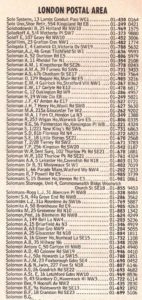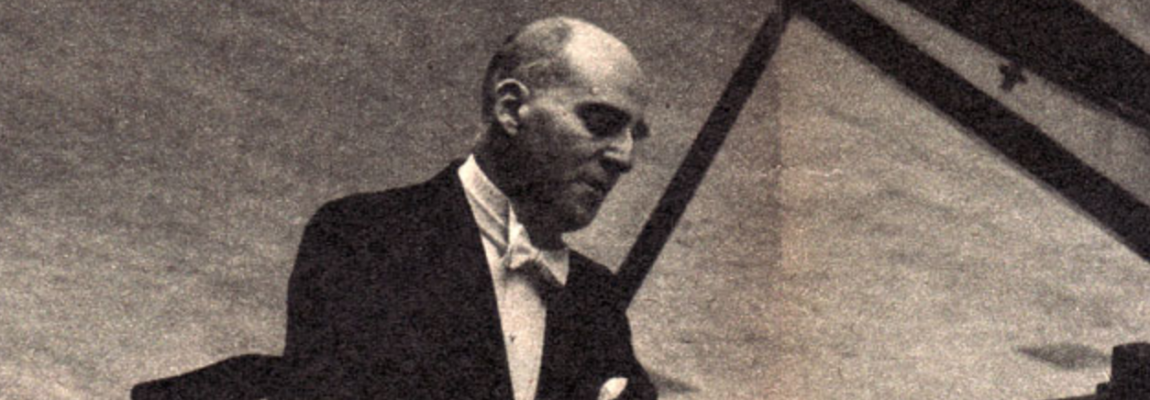The distinguished Canadian pianist Robert Silverman and I share a deep admiration for the British pianist Solomon. Over the course of our regular mealtime meetings in Vancouver, we spend hours discussing a wide array of musical topics and pianists (great and otherwise); recently when Solomon came up, Maestro Silverman told me he had many years ago produced a documentary for the CBC in tribute to the artist. The five episodes included interviews with many who knew Solomon, but for reasons that are clarified in his notes below, the project’s scope was limited by the pianist’s wife. My eyes lit up when he said that he not only had these programmes on cassette but had had them digitized. I thought that something of this nature should be available for lovers of the great pianists of the past and offered to upload them if he agreed – and fortunately he did.
Below are the five one-hour episodes that feature some biographical information by Silverman, and interview snippets with musicians and friends of the artist. And of course there are many representative recordings by the great pianist.
Here are some introductory notes giving important background information to the series by Robert Silverman himself:
In the golden years of the CBC, before men in suits replaced creative music programming with packaged short selections for daytime listeners, producer George Laverock and I came up with an idea of a five-programme series devoted to the artistry of the British pianist Solomon. Then in his mid-seventies, Maestro Cutner (his actual surname) had been pianistically silent for about two decades, due to a debilitating stroke he’d suffered at the height of his powers.
The project was approved, and even expanded upon to the point where George and I were to travel to London to interview distinguished musicians such as Clifford Curzon and Gerald Moore, important BBC and HMV producers, and others who had worked in various capacities with Solomon. Those interviews were to be interspersed with some of his greatest recordings. Naturally, I also wrote the artist asking whether he and his wife Gwendolyn would agree to add a few words.
Responses came quickly. To say we were excited is to state the obvious. Not only did Sir Gerald Moore immediately agree enthusiastically, but he sent directions about how to find his home in his out-of-the way village. However, I also received a note from Gwen, asking that we not bother his friends; they had contributed to a BBC documentary to celebrate Solomon’s 70th birthday, and there was no need to impose further upon them. But she would be happy to receive me at their home. I responded that I would be delighted to meet her, and that she needn’t worry about any imposition on their friends: judging from the responses we’d received, they were extremely enthusiastic about talking about Solomon. In addition, the focus of the programmes was to be on his artistry, not his biography. (In other words, we weren’t coming there to snoop around for gossip.)
George went to London a couple of days before I did in order to prepare for the interviews and set up recording sessions with the guests. Upon my arrival, George informed me that to a person, all the artist’s close friends had cancelled their interviews. No Curzon, no Moore, who wrote an apology saying that he’d truly wanted to do the interview, but that he simply could not go against Solomon’s wishes.

George was insistent that we carry on with the project. He arranged alternate interviews with other musicians, such as Denis Matthews, with connections to Solomon. Also, the BBC made available to us their 70th birthday documentary from 1972, so I ended up recording several questions that fit the answers that the BBC interviewees had provided for that occasion so that we could incorporate them into our tribute.
As for the meeting at their home on Blenheim Road in St. John’s Wood (the address and telephone number were in the phone book), not only was Gwendolyn Solomon, as she called herself, present, but so was Solomon. I had not expected this, and the entire afternoon remains much of a haze, so excited was I at finally meeting the person who has come closest to serving as my artistic deity. He would not discuss his artistry — he seldom did, even when healthy — and when Gwen started to complain about how unfair life seemed to be, he shushed her.
Afterwards, I understood why she had tried to hinder our project. In the earlier BBC interview she had revealed somewhat more than she’d intended about her personal bitterness over the stroke. Furthermore, both of them did not want it known that the stroke’s effects were more serious than anyone had let on at the time. He had serious speech difficulties, and what he did say mostly made perfect sense, but not always. However, I can attest that he did know how to make a great gin and tonic.
Here, courtesy of Maestro Silverman, to whom our greatest thanks, are the five parts of the 1976 CBC documentary he so lovingly produced.
Part 1
Part 2
Part 3
Part 4
Part 5
